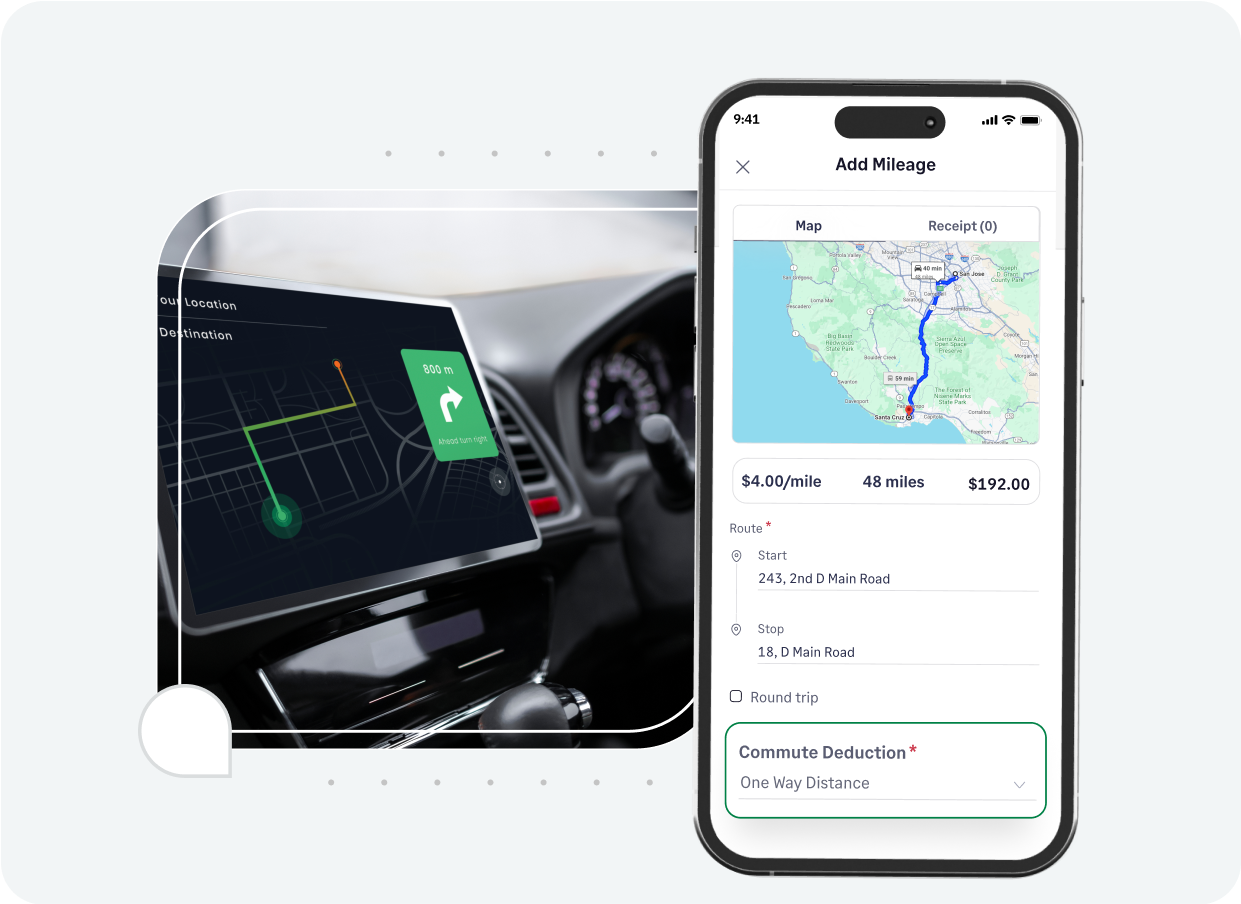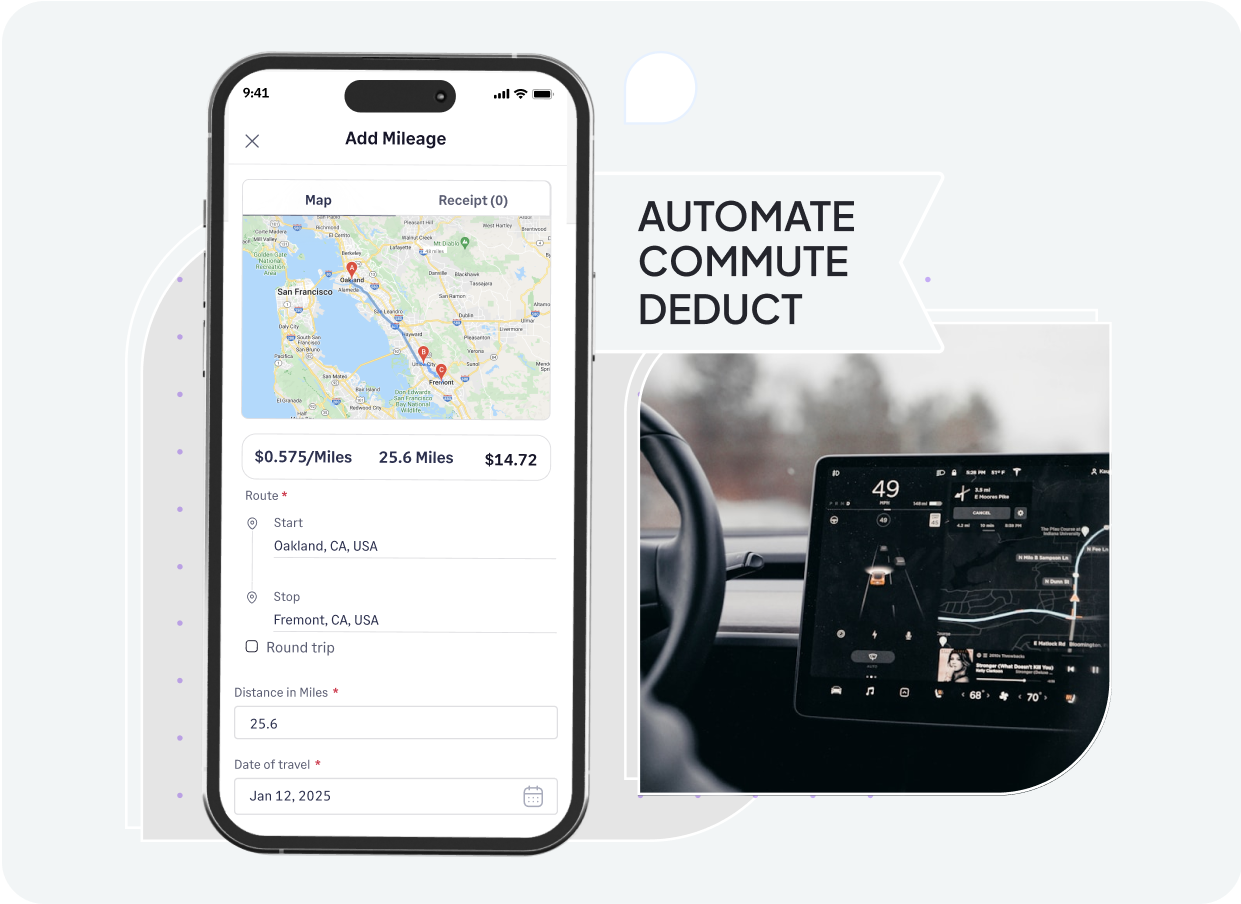Understanding mileage reimbursement is essential for both employers and employees in North Carolina when personal vehicles are used for business travel. While North Carolina has specific labor laws, it's important to know how they apply to mileage and how federal guidelines often play a role.
This guide will cover typical mileage rates used in North Carolina, relevant legal considerations for private employers, and how Sage Expense Management can help streamline your mileage tracking and reimbursement processes.
North Carolina Mileage Reimbursement Rate
For private employers in North Carolina, it's important to understand that state law does not mandate a specific mileage reimbursement rate. There isn't a legislated per-mile amount that companies are legally required to pay employees for using their personal vehicles for work.
However, many businesses throughout North Carolina choose to use the standard mileage rates published annually by the Internal Revenue Service (IRS) as a reliable benchmark. This is a common practice for several key reasons:
- It offers a nationally recognized standard that is calculated to reflect the average costs associated with operating a vehicle for business purposes, including fuel, maintenance, insurance, and depreciation.
- Reimbursements made at or below the current IRS standard business rate are generally non-taxable income for the employee, provided that proper and accurate records are maintained.
- It provides a consistent and transparent method for compensating employees fairly.
As of January 1, 2025, the key IRS standard mileage rates are:
- 70 cents per mile for business use of a vehicle.
- 21 cents per mile for medical or moving purposes (it's important to note that the deduction for moving expenses is currently limited to active-duty members of the U.S. Armed Forces).
- 14 cents per mile driven in service of charitable organizations.
For historical context, here are the IRS standard business mileage rates from recent years:
It's worth noting that specific government entities, like federal courts in North Carolina, may set their own mileage rates for official travel (e.g., for jurors, often aligning with GSA/IRS rates).
Similarly, the State of North Carolina has rules for its own employees. However, these rates for government-related travel do not apply to private-sector businesses.
North Carolina Mileage Reimbursement Calculator
Need to quickly estimate your mileage reimbursement? Our North Carolina Mileage Reimbursement Calculator can assist you.
Using the North Carolina Mileage Reimbursement Calculator is simple:
- Choose the tax year for which you want to calculate the reimbursement. Our calculator uses the IRS standard mileage rates applicable for that year, as these are a common benchmark in North Carolina.
- Input the total business miles driven. The calculator will then provide an estimated reimbursement amount, offering a helpful figure for both employees and employers in North Carolina.
Calculate
Results
Some Important North Carolina Mileage Reimbursement Laws
While North Carolina doesn't set a specific mileage reimbursement rate for private companies, certain labor laws are important to consider:
1. No State-Mandated Rate
To reiterate, North Carolina law does not require private employers to reimburse employees for mileage at a specific rate.
2. North Carolina Minimum Wage & FLSA
This is the most crucial legal consideration. Employers must ensure that any unreimbursed business-related expenses, such as mileage for work-related travel in an employee's personal vehicle, do not cause an employee's effective hourly wage to fall below the North Carolina minimum wage.
- North Carolina's minimum wage is currently $7.25 per hour, which is the same as the federal minimum wage.
- If an employee incurs driving expenses that are primarily for the benefit of the employer, and these costs (when factored into their weekly earnings and hours worked) reduce their pay to less than $7.25 per hour, the employer could be in violation of the North Carolina Wage and Hour Act and the federal Fair Labor Standards Act (FLSA).
3. Adherence to Company Policy/Agreement
If an employer establishes a policy or enters into an agreement to reimburse employees for mileage, they are expected to honor that commitment.
The North Carolina Wage and Hour Act requires employers to pay employees all wages and benefits due according to the terms of employment.
4. Record-Keeping
While North Carolina law might not prescribe a specific format for mileage logs for private employers, maintaining accurate and contemporaneous records is a best practice and essential for:
- Employers: To substantiate any reimbursement amounts paid and to have records in case of an FLSA wage and hour inquiry.
- Employees: To justify reimbursement requests according to company policy and for personal tax purposes if applicable. IRS guidelines generally require logs to include dates of travel, business purpose, miles driven, and locations.
North Carolina Mileage Reimbursement Law vs Federal Law
Understanding the relationship between North Carolina's approach and federal law provides additional clarity:
Federal Law (FLSA):
- The FLSA does not explicitly mandate mileage reimbursement by private employers.
- Its primary role in this context is ensuring that unreimbursed work-related expenses do not illegally reduce an employee's wages below the federal minimum wage ($7.25 per hour).
North Carolina State Law:
- Aligns with Federal Minimum Wage: North Carolina's minimum wage of $7.25 per hour mirrors the federal rate. Therefore, the FLSA's minimum wage protection regarding unreimbursed expenses directly applies in North Carolina without a separate, higher state minimum wage to consider (unlike some other states).
- No Specific Reimbursement Statute: North Carolina does not have its own law compelling private employers to reimburse mileage at a specific rate.
- Enforcement of Promised Benefits: The North Carolina Wage and Hour Act does ensure that employers pay wages and benefits that have been promised to employees as part of their employment agreement.
IRS Guidelines:
- These are federal tax guidelines, not laws that force private employers to reimburse.
- They define the rate at which mileage reimbursements are generally non-taxable to employees. This is why many North Carolina employers, like those nationally, use the IRS rates (e.g., 70 cents per mile for business in 2025) as a standard for their reimbursement policies.
In North Carolina, the legal landscape for private employers concerning mileage reimbursement is primarily shaped by federal FLSA minimum wage requirements, rather than specific state mandates on reimbursement rates.
However, any promises made regarding reimbursement should be upheld.
How Sage Expense Management (formerly Fyle) Can Automate Mileage Tracking
Whether your team travels through North Carolina's bustling cities or covers ground in its diverse rural regions, manual mileage tracking can be a tedious and error-prone task. Sage Expense Management offers an intelligent, automated solution to simplify mileage tracking and reimbursement for businesses across NC.
- Accurate mileage tracking: Ensure every business mile driven in North Carolina is precisely captured. We integrate with Google Maps, providing accurate distance calculations for all work-related travel, giving you confidence in your reimbursement data.
- Uphold compliance with wage laws: By facilitating accurate mileage logs, we help North Carolina businesses maintain the necessary records to demonstrate that employee earnings comfortably meet or exceed minimum wage requirements, even after accounting for vehicle use for company purposes.
- Save time for your North Carolina team: Free up your employees from the hassle of manual logs and complicated spreadsheets. Our user-friendly mobile app (available for iOS and Android) allows for effortless mileage tracking on the go. Employees can even submit expenses through familiar tools like Slack or Outlook, streamlining the entire process.
- Flexible for your business needs: If your company chooses to set a specific reimbursement rate—be it the IRS standard or a custom rate—we offer the customization to adapt to your North Carolina business’s policies.
- Smooth integration with accounting systems: Sage Expense Management connects with popular accounting software such as QuickBooks, Xero, and NetSuite. This ensures that mileage expense data flows directly and accurately into your financial systems, simplifying reconciliation for your North Carolina operations.
- Keep reimbursements on schedule: Automated approval workflows and timely reminders mean that mileage reports are submitted and processed efficiently, ensuring your North Carolina employees receive their reimbursements without unnecessary delays.
Don't let outdated mileage tracking methods slow down your business. See how Sage Expense Management can bring new levels of efficiency, accuracy, and ease to your mileage reimbursement procedures.


































